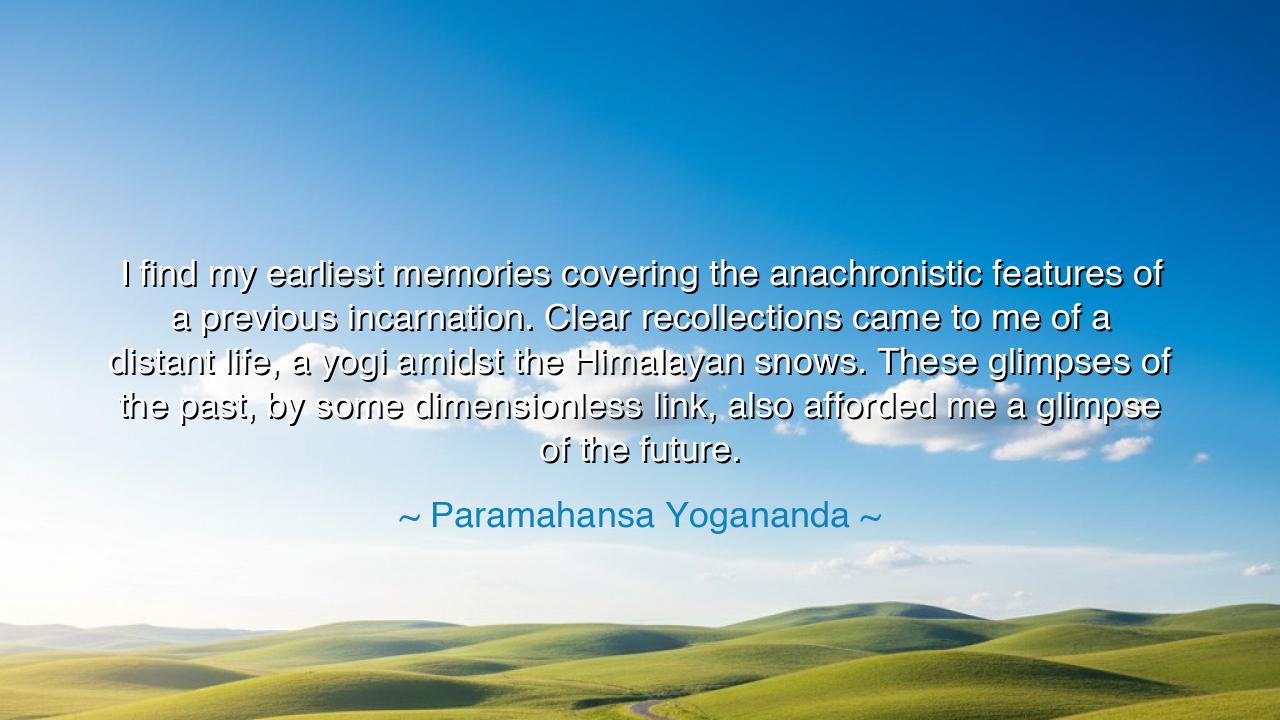
I find my earliest memories covering the anachronistic features
I find my earliest memories covering the anachronistic features of a previous incarnation. Clear recollections came to me of a distant life, a yogi amidst the Himalayan snows. These glimpses of the past, by some dimensionless link, also afforded me a glimpse of the future.






In the depths of human consciousness, there lies a truth that has been known to the great mystics, sages, and seekers of the ancient world: the past, the present, and the future are not separated by the lines of time as we commonly perceive them. Paramahansa Yogananda, in his profound reflection, speaks of a vision that transcends the boundaries of time: "I find my earliest memories covering the anachronistic features of a previous incarnation. Clear recollections came to me of a distant life, a yogi amidst the Himalayan snows. These glimpses of the past, by some dimensionless link, also afforded me a glimpse of the future." In these words, Yogananda touches upon the timeless truth that the soul is not confined to a single lifetime but is on an eternal journey, experiencing past lives and seeing the future through a lens beyond the limitations of time.
The ancients believed that the soul is eternal, existing before birth and after death, traveling through countless incarnations. Plato spoke of the reminiscence theory, where he suggested that knowledge is not something we acquire in this lifetime, but something we remember from previous lives. The great Hindu sages, too, like Vyasa in the Mahabharata, spoke of the soul’s journey through countless bodies, learning lessons through repeated cycles of life and death. Yogananda’s insight that his memories of a previous incarnation—a life as a yogi in the Himalayas—bring clarity to his future, speaks to this ancient wisdom: that the soul’s evolution is not linear, but cyclical, with echoes of the past reverberating through our present and future.
Consider the story of Buddha, who in his quest for enlightenment, recalled his many past lives through deep meditation and self-reflection. These memories did not arise from mere curiosity but were essential to his understanding of samsara—the cycle of birth, death, and rebirth. In these recollections, Buddha saw the suffering of his past selves and realized that true enlightenment could only come through breaking free from the endless cycle. His ability to remember his past provided him with the wisdom to navigate his present and future, showing that understanding the soul's journey across lifetimes is essential to spiritual awakening.
Yogananda’s teachings also point to the connection between time and consciousness—that there is a dimension beyond the ordinary experience where the soul can access knowledge of both the past and future. This is not just mystical speculation, but a reality for those who, through intense spiritual practice and meditation, can pierce the veil of time. Yogananda himself, a yogi who spent years in deep contemplation, experienced these glimpses of the past and future. Through meditation, he not only remembered his previous life as a yogi in the Himalayas but saw his role in guiding others in this lifetime. This sense of knowing—beyond the limitations of time—affords a deeper understanding of one’s purpose and mission.
The lesson that emerges from Yogananda’s words is profound: that our soul’s journey is far greater than the single lifetime we experience in the flesh. Just as the great sages and mystics of old found wisdom in remembering past lives, so too can we learn to awaken our own memories of the past and glimpse the paths that lie ahead. By understanding the timeless nature of our existence, we can embrace the present with the knowledge that it is part of a much greater story—one that stretches across lifetimes. We are not merely victims of fate, but participants in the unfolding drama of our soul’s evolution, with the power to shape both our present and future through conscious action.
In our daily lives, we can take inspiration from Yogananda’s insights. Reflect upon your actions and decisions, not as isolated moments, but as part of a larger, eternal journey. Meditate, pray, or engage in self-reflection to explore the patterns and lessons that may have followed you from past lives. Seek to understand that every struggle or triumph may not be the first of its kind, but part of an ongoing soul evolution. In this way, we can break free from the chains of karma, making choices that lead us toward greater wisdom, peace, and spiritual fulfillment.
Ultimately, the teachings of Paramahansa Yogananda invite us to see beyond the illusions of time and embrace our eternal nature. Our soul’s journey is not limited to the events of this life but stretches far beyond, weaving together the past, present, and future into a seamless tapestry of divine wisdom. By meditating on the eternal nature of the soul, we come to understand that the lives we live are merely steps on the path to a higher purpose—one that transcends time and leads us ever forward toward spiritual enlightenment.






AAdministratorAdministrator
Welcome, honored guests. Please leave a comment, we will respond soon